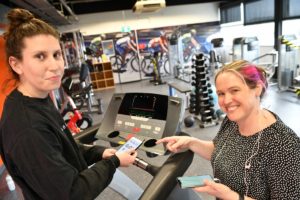
Gyms and sporting clubs might close, and lockdown conditions make it difficult to exercise, but people are urged to take the next step and download fitness apps to keep moving.
Less traditional, self-managed exercise programs have advantages, say Flinders University researchers, who conducted a study to look into the psychological and mental health barriers which promote or prevent people from engaging with physical activity apps during the initial COVID-19 lockdown in April-May last year – and perhaps regularly in the future.
“We’re interested in how using technology such as mobile apps during lockdown can provide people with opportunities to be physically active, and how people’s state of mind might affect this,” says lead researcher Jasmine Petersen, from the Caring Futures Institute at Flinders University.
“It’s important for people to keep active during lockdown, particularly if their mental health or self-motivations are affected by lockdown during the pandemic.”
More than half of the Australian adult population is insufficiently active and do not meet current guidelines (Australian Institute of Health and Welfare, 2020).
“We know that closure of indoor and outdoor sporting facilities, cancellation of sporting competitions, isolation, social distancing, and travel restrictions are affecting our engagement in physical activity, so urgent steps need to be taken to address this.”

The Flinders University study found more than half (53%) of the 408 Australian adults (80% females) surveyed in the national online study reported a corresponding decline in physical activity while only 24% reported an increase in activity.
Their fitness before going into lockdown was compared with their subsequent social support networks, general mental health and motivation to start using commercial physical activity apps during the April-May 2020 lockdown.
Social support (from family, social media, etc), self-efficacy (an individual’s beliefs in their ability to perform physical activity) and motivation were found crucial in respondents seeing the value of physical activity, making them more likely to use the apps during lockdown.
The most frequently used apps were Strava (23%), Fitbit (16%), and Garmin (10%). Participants largely reported using their apps seven times per week (35%), followed by 5 times (13%) and 3 times per week (13%).
Among app users, 54% reported that the physical activity app they were currently using had an app-specific community, and of these 55% reported engaging with the community. Additionally, most app users (83%) engaged with existing social networking platforms in relation to physical activity.
The main types of physical activity participants reported engaging in during the COVID-19 lockdown were walking (43.5%), running (19.0%), home workouts (16.1%), yoga/pilates (6.0%), cycling (5.6%), and strength training (3.1%).
As a result, the researchers recommend interventions using physical activity apps to increase social support, self-efficacy and autonomous motivations to support engagement in physical activity during a pandemic.

“Commercial physical activity apps are accessible, affordable, and an easy step for people to maintain their physical activity during a pandemic, and thus the use of these apps should be promoted and encouraged,” says health psychologist Associate Professor Ivanka Prichard, senior author of the paper published in Psychology of Sport and Exercise.
“If the reported reductions in physical activity during the COVID-19 lockdown are contributing to heightened levels of depression, anxiety, and stress, it is imperative that interventions are designed to support engagement in physical activity during a pandemic to foster positive physical and mental health outcomes” she says.
The article, ‘Promoting physical activity during the COVID-19 lockdown in Australia: The roles of psychological predictors and commercial physical activity apps (2021) by Jasmine M Petersen, Eva Kemps, Lucy K Lewis and Ivanka Prichard has been published in Psychology of Sport and Exercise (Elsevier) DOI: 10.1016/j.psychsport.2021.102002
Acknowledgements: The study was supported by a COVID-19 Agility Research Grant from the Caring Futures Institute, College of Nursing & Health Sciences, Flinders University.

